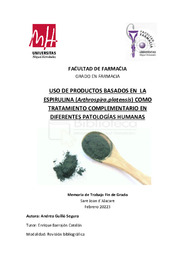Por favor, use este identificador para citar o enlazar este ítem:
https://hdl.handle.net/11000/29818Registro completo de metadatos
| Campo DC | Valor | Lengua/Idioma |
|---|---|---|
| dc.contributor.advisor | Barrajón-Catalán, Enrique | - |
| dc.contributor.author | Guilló Segura, Andrea | - |
| dc.contributor.other | Departamentos de la UMH::Farmacología, Pediatría y Química Orgánica | es_ES |
| dc.date.accessioned | 2023-10-25T08:39:30Z | - |
| dc.date.available | 2023-10-25T08:39:30Z | - |
| dc.date.created | 2023-02-01 | - |
| dc.identifier.uri | https://hdl.handle.net/11000/29818 | - |
| dc.description.abstract | El principal objetivo de esta revisión bibliografía es identificar los beneficios que presenta el consumo de Espirulina (A.platensis) al ser incluida en la dieta humana, y de qué manera actúa en diferentes situaciones clínicas. Para ello se ha realizado una búsqueda en diferentes bases datos como Pubmed, Cochrane library y Embase, incluyendo únicamente los ensayos clínicos que se ajusten a los criterios de inclusión establecidos. Después de analizar los diferentes ensayos clínicos sobre los que se ha desarrollado el trabajo, se ha visto que la mayoría de los beneficios que A.platensis, causa en la salud humana están relacionados con su contenido en pigmentos bioactivos, fundamentalmente con las ficobiliproteínas y, más concretamente con su componente mayoritario, C-ficocianina. Este pigmento es capaz de mejorar las diferentes alteraciones clínicas que presentan pacientes con síndrome metabólico, con SIDA, con obesidad, con hipertensión arterial (HTA) y con Diabetes mellitus tipo II. En todos los casos se obtiene una disminución de los triglicéridos y del colesterol de baja densidad (C-LDL) y un aumento del colesterol de alta densidad (C-HDL) tras el consumo de una dosis diaria determinada de espirulina. Sin embargo, se ha observado que para obtener resultados más significativos y duraderos, el consumo de esta microalga debe ir siempre acompañado de un estilo de vida saludable. Y que al ser algo relativamente novedoso, en todos los casos se propone el desarrollo de más ensayos clínicos a futuro | es_ES |
| dc.description.abstract | The main objective of this literature review is to identify the benefits of the consumption of Spirulina (A.platensis) when included in the human diet, and how it acts in different clinical situations. For this aim, a search in different databases such as Pubmed, Cochrane library and Embase, has been developed including only clinical trials that fit the established inclusion criteria. After analyzing the different clinical trial son which the work has been developed, it has been seen that most of the benefits that A.platensis causes in humans health are related to its content in bioactive pigments, mainly with phycobiliproteins and, more specifically with its major component, C-phycocyanin. This pigment is to improve the different clinical alterations presented by patient with metabolic syndrome, AIDS, obesity, high blood pressure and type II diabetes mellitus. In all cases, a decrease in triglycerides and LDL-C and an increase in HDL-C are obtained after consumption of a certain daily dose of Spirulina. However, it has been observed that to obtain more significant and lasting results, the consumption of this microalgae should always be accompanied by a healthy lifestyle. Finally,due to the novelty of these products, it is recommended in all cases the development of more clinical trials is proposed in the future. | es_ES |
| dc.format | application/pdf | es_ES |
| dc.format.extent | 42 | es_ES |
| dc.language.iso | spa | es_ES |
| dc.publisher | Universidad Miguel Hernández de Elche | es_ES |
| dc.rights | info:eu-repo/semantics/openAccess | es_ES |
| dc.rights.uri | http://creativecommons.org/licenses/by-nc-nd/4.0/ | * |
| dc.subject | espirulina, arthrospira platensis (A.platensis) | es_ES |
| dc.subject | consumo humano | es_ES |
| dc.subject | síndrome metabólico | es_ES |
| dc.subject | SIDA | es_ES |
| dc.subject | obesidad | es_ES |
| dc.subject | hipertensión | es_ES |
| dc.subject | diabetes mellitus tipo II | es_ES |
| dc.subject | triglicéridos (TG) | es_ES |
| dc.subject | colesterol de baja densidad (C-LDL) | es_ES |
| dc.subject | colesterol de muy baja densidad (VLDL) | es_ES |
| dc.subject | colesterol de alta densidad (C-HDL) | es_ES |
| dc.subject.other | CDU::6 - Ciencias aplicadas::61 - Medicina::615 - Farmacología. Terapéutica. Toxicología. Radiología | es_ES |
| dc.title | Uso de productos basados en la espirulina (arthrospira platensis) como tratamiento complementario en diferentes patologías humanas | es_ES |
| dc.type | info:eu-repo/semantics/bachelorThesis | es_ES |

Ver/Abrir:
Guilló Segura Andrea TFG.pdf
2,11 MB
Adobe PDF
Compartir:
 La licencia se describe como: Atribución-NonComercial-NoDerivada 4.0 Internacional.
La licencia se describe como: Atribución-NonComercial-NoDerivada 4.0 Internacional.
.png)